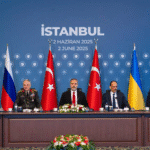In a closely contested election, nationalist candidate Karol Nawrocki has been elected President of Poland, defeating liberal incumbent Rafał Trzaskowski by a slim margin. The National Electoral Commission announced on June 2 that Nawrocki secured 50.89% of the vote (10,606,877 votes), while Trzaskowski garnered 49.11% (10,237,286 votes).
Nawrocki, a conservative historian and former head of the Institute of National Remembrance, was backed by the right-wing Law and Justice (PiS) party. His victory is seen as a significant setback for Prime Minister Donald Tusk’s pro-European Union government, which had aimed to reverse controversial judicial reforms implemented by the previous PiS administration.
The election highlighted the deep divisions within Polish society. While Trzaskowski performed strongly in urban and western regions, Nawrocki found support in rural and eastern areas. Notably, Nawrocki achieved over 70% of the vote in the Subcarpathian Voivodeship, whereas Trzaskowski secured more than 58% in the Pomeranian and West Pomeranian regions. Voter turnout was robust, with 71.63% of eligible voters participating in the second round, reflecting the high stakes and public engagement in the election.
Nawrocki’s presidency is expected to introduce significant challenges for the Tusk administration. Although the Polish presidency is largely ceremonial, it holds veto power over legislation. Nawrocki has indicated his willingness to use this authority to block Tusk’s reform agenda, particularly efforts to restore judicial independence and align more closely with EU standards. In response to the election outcome, Prime Minister Tusk announced plans to seek a vote of confidence in the parliament, acknowledging the potential for increased political gridlock.
Nawrocki’s candidacy was marked by controversy. Investigative reports have alleged misuse of public funds during his tenure at the Institute of National Remembrance and claims of using the institution to advance his political ambitions . Additionally, his past involvement in football hooliganism and associations with criminal elements have raised concerns, though his supporters dismiss these as politically motivated attacks.
On foreign policy, Nawrocki has expressed a commitment to supporting Ukraine in its conflict with Russia but has emphasized the need for reciprocity in bilateral relations. He has criticized European elites for their role in the Ukraine conflict, suggesting that their policies contributed to the war. Nawrocki’s alignment with nationalist leaders across Europe, including endorsements from figures like France’s Marine Le Pen and Hungary’s Viktor Orbán, signals a potential shift in Poland’s international posture.
Domestically, Nawrocki has pledged to uphold traditional values, protect workers’ rights, and resist EU climate policies. He secured the endorsement of the influential Solidarity trade union by promising to maintain the current retirement age, defend the minimum wage, and support Polish agriculture.
Nawrocki is set to assume office on August 6, 2025, succeeding outgoing President Andrzej Duda. His presidency is anticipated to usher in a period of political tension and potential legislative stalemate, as the government and presidency may clash over key policy directions. The election results underscore the polarized nature of Polish politics and the challenges ahead in navigating domestic and international issues.















